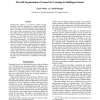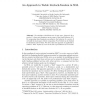133
Voted
NIPS
2003
15 years 4 months ago
2003
We exploit some useful properties of Gaussian process (GP) regression models for reinforcement learning in continuous state spaces and discrete time. We demonstrate how the GP mod...
97
Voted
NIPS
2003
15 years 4 months ago
2003
A mobile robot acting in the world is faced with a large amount of sensory data and uncertainty in its action outcomes. Indeed, almost all interesting sequential decision-making d...
127
Voted
IJCAI
2001
15 years 4 months ago
2001
We present a dynamic programming approach for the solution of first-order Markov decisions processes. This technique uses an MDP whose dynamics is represented in a variant of the ...
127
Voted
FLAIRS
2004
15 years 4 months ago
2004
er provides new techniques for abstracting the state space of a Markov Decision Process (MDP). These techniques extend one of the recent minimization models, known as -reduction, ...
97
Voted
CASCON
2006
15 years 4 months ago
2006
State based protocols are protocols in which the handling of one message depends on the contents of previous messages. Testing such protocols, for security or for other purposes u...
133
Voted
AIIDE
2006
15 years 4 months ago
2006
Reinforcement learning is an effective machine learning paradigm in domains represented by compact and discrete state-action spaces. In high-dimensional and continuous domains, ti...
146
Voted
AWPN
2008
15 years 4 months ago
2008
We calculate a fixed finite set of state space fragments for a service P, where each fragment carries a part of the whole behavior of P. By composing these fragments according to t...
110
Voted
COLT
2008
Springer
15 years 4 months ago
2008
Springer
We propose a model-based learning algorithm, the Adaptive Aggregation Algorithm (AAA), that aims to solve the online, continuous state space reinforcement learning problem in a de...
130
Voted
ASMTA
2008
Springer
15 years 4 months ago
2008
Springer
The solution of continuous and discrete-time Markovian models is still challenging mainly when we model large complex systems, for example, to obtain performance indexes of paralle...
135
click to vote
APN
2008
Springer
15 years 4 months ago
2008
Springer
In this paper, we address the class of bounded Petri nets with stopwatches (SwPNs), which is an extension of T-time Petri nets (TPNs) where time is associated with transitions. Con...


